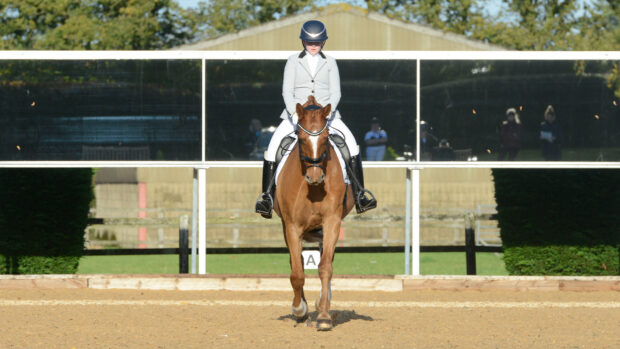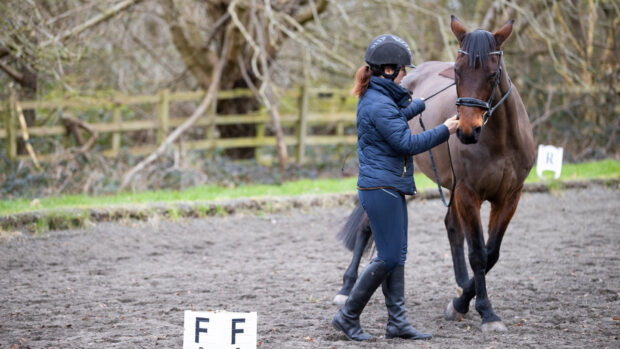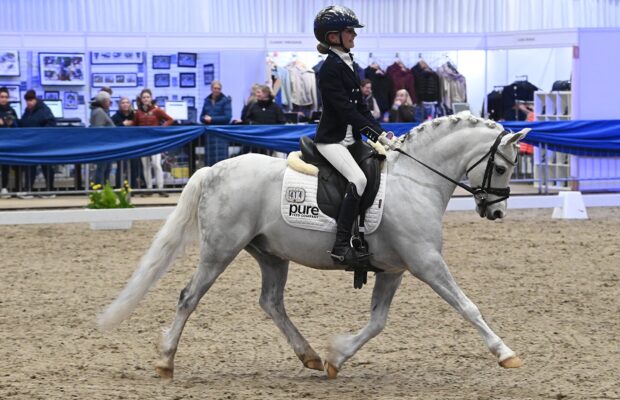Do you struggle to get your horse working as well at a competition as he does at home? That effortless, relaxed feeling you know they are capable of can be mirrored in the dressage arena — you just have to hone your warm up routine.
Leading dressage rider Andrew Gould uses a tried and tested formula that gets results. Here are his top tips for creating your own effective warm-up plan, too.
1. Work as you would at home
“How you warm up shouldn’t really change from what you do at home,” advises Andrew. “But at an event you get caught up with people watching, other riders working around you and the pressure to perform. As a result, you change what you are doing and ride differently.”
Settling into a familiar pattern will help your horse — and you — relax and focus.
“The key is to keep what you’re doing along the same lines, as though you are at home.”
2. Know your horse
If your horse does his best work after 15 minutes of working in at home, use this as a guideline for how long to warm up at an event.
“Some horses are affected by the atmosphere and what’s going on around them, but even in that scenario less can be more,” says Andrew.
“Use smaller events to test warm-up times. You might get it wrong and do too little the first time, and then too much the next. Eventually you will find the right point and it will be beneficial in the long run.”
3. Consider a double warm-up
Horses that need more work might benefit from two or more shorter sessions, rather than a long warm-up immediately before the test.
“Older and more experienced horses will be better off going for a hack in the morning so that they can have a stretch and take in their surroundings without any pressure,” says Andrew. “Then they come out before the test and do a short warm-up that closely matches what you do at home.”
Continued below…
Like this? You may also enjoy reading these articles…
Does seeing female competitors without hairnets make your
Horse & Hound's dressage editor Alice Collins, who

25 signs you’re an incurable dressage diva/divo

3 easy steps to nailing the perfect dressage-ready canter
4. Don’t overdo it
Like humans, horses start to ache, too. Therefore it is not productive to spend 30 minutes trotting and cantering a horse in a test outline, because by the time they enter the arena they will be tired.
“I see a lot of people riding their horses in a high, test outline in the warm-up,” says Andrew. “By the time they get into the arena the horse is shattered and trying to go on its forehand.
“Know the moment your horse is ready to come up into self-carriage and work backwards from that. I bring some of my horses up to the contact when the bell goes, but others will do this 10 minutes before.”
5. Is he forward or excited?
It is easy to think that a tense or excitable horse is working forward when he isn’t.
“A hot horse isn’t the same as a forward-thinking one,” explains Andrew. “The latter accepts the aids and that is vital. If a horse is so hot that you can’t touch it with your leg, it’s not thinking forward and you can’t ride a good test.”
6. Think three movements ahead
“You should know the test so well that you don’t have to think about it in the arena,” adds Andrew. “If you’re thinking about where to turn next you can’t ride boldly and forward, and that will cost marks.”
Andrew recommends being three movements ahead in your mind the whole way through the test.
“Snooker players line up three balls they want to pop and dressage is the same. Each movement sets up the next, so you must plan ahead.”
Why you won’t want to miss the H&H Festival of Dressage…
The Horse & Hound Festival of Dressage is a three-day unaffiliated competition featuring championship classes from intro to medium level, as well as warm-up and evening freestyle competitions. It is being held at Sheepgate Equestrian, Lincs on 20-22 July. There will be a prize fund of about £1,000 per level, including winners’ rugs and top-quality prizes. And as well as the dressage, competitors are invited to a drinks reception on the Friday, a hog roast on the Saturday and more evening entertainment, giving all the buzz of a stay-away championship. Find out more >>
Don’t miss this week’s dressage special issue of Horse & Hound magazine (23 March 2017), including our exclusive interview with Isabell Werth




